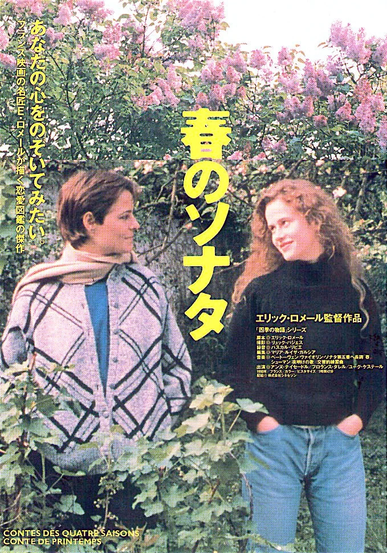"A Tale of Springtime", Dir: Éric Rohmer, 1990
- Ravi Swami
- Mar 27, 2022
- 3 min read
Continuing with his series of films arranged into 4 part anthologies according to a theme,
Éric Rohmer's 1990 film "A Tale of Springtime" is another finely observed examination of relationships, this time featuring the growing friendship between "Jeanne" (Anne Teyssèdre), a philosophy teacher and a young woman, "Natacha" (Florence Darel) who she meets by chance at a party.
Jeanne is moving out of her Paris apartment temporarily in order to allow her cousin to have a rendezvous there with her boyfriend who is in the military and her boyfriends' flat is a mess in his absence - we never actually see him in the film.
Natacha invites Jeanne to stay at the "pied a terre" apartment she shares with her father "Igor" (Hugues Quester), a businessman who only occasionally drops by to collect clothes between business trips and staying at the flat of his girlfriend "Eve" since he is separated from Natacha's mother.
The two women bond and Natacha invites Jeanne to stay at her family home in the country, something that is complicated by the fact that her father makes an unannounced appearance at the flat and catches Jeanne as she emerges from the shower and while there is no obvious attraction between the two, Natacha speculates that there may be, especially since she is not especially fond of his girlfriend Eve, who is almost the same age as her, and is looking for some excuse to wreck their relationship.
Natacha engineers a situation where Jeanne, her father, Eva, herself and her boyfriend all turn up at the country house and this sets the scene for a story about crossed wires, misunderstandings and volatile discussions centering on philosophy (Eva is a rather opinionated psychology graduate) with Jeanne, while the younger Natacha starts to see her plot unravel, something that leads to a rift in her short-lived friendship with Jeanne.
Eva leaves following a heated confrontation with Natacha which leads to a situation where Jeanne and Igor are alone in the house after Natacha conveniently disappears to spend time with the boyfriend who is almost the same age as her father. Igor makes a play for Jeanne when she intimates that she may be considering dumping her boyfriend but it goes nowhere when she realises that she may end up being just another notch on his bedpost.
Jeanne returns to her apartment, now vacated by her cousin who has thoughtfully left fresh flowers for her and then she goes to her boyfriends' flat to try and renew their relationship, with the flowers signifying a kind of renewal.
The film has all the hallmarks of Rohmer's earlier films and if anything is even more condensed in terms of carefully observed scripting and the kind of philosophical debates that typified his earliest work like "My Night At Maud's" without ever feeling overly contrived, by which I mean you never question the notion that people can have serious deep conversations all the time and at every juncture, now matter how banal their interactions and you can imagine it being satirised for comedic effect in a different kind of film.
The plot does feel a little weighed down with the philosophical discussions and sense of the character's self-reflection and awareness compared to his earlier films but without slowing down the momentum of the story too much.
Since I discovered Rohmer's work I've become a bit of a fan and I always have time for his films and so "A Tale of Winter" is next on the list followed hopefully by the remaining two films of the series, also on Mubi channel via Apple TV +.
"A Tale of Springtime", Dir: Éric Rohmer, 1990
Mubi / Apple Tv +








Comments